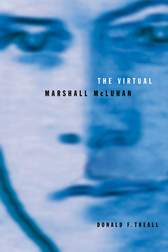me | probes | managers | virtual | space
The Virtual Marshall McLuhan (2001) by Donald F. Theall, is a book by
McLuhan's first graduate students that combines personal reflection and scholarly,
historical assessment of McLuhan's work. Theall's book is the best comprehensive
introduction to McLuhan's thinking, methods, and his roller-coaster career.
If anyone were to lay claim to understanding Marshall McLuhan, it might be Donald
Theall, but as the title of his book suggests, McLuhan's personality, thought,
and interests resist a static, stable, identity. Of equal interest, perhaps, are the similarities between McLuhan and Kenneth
Burke that Theall alludes to. McLuhan had clearly separated himself from his
contemporary communication theorist like Shannon and Weaver, and Theall points
out that McLuhan's sense of communication as participatory, involving the audience
as co-creators, strikes cords with Burke's notions of symbolic action (60).
Theall points out that artists like John Cage, Woody Allen, and Robert Rauschenberg
were influenced by McLuhan (94), and he notes that as and scholars like George
Landow, Richard Lanham, Stuart Moulthrop, and Jay Bolter (162) have all grappled
with McLuhan (162). Theall consistently returns his argument that McLuhan should
be understood as a satirist and poet rather than theorist, however, and the
McLuhan was more influenced by artists than scholars, and in turn had a greater
impact in literary and art circles than scholarly circles.  Theall, Donald. The Virtual Marshall McLuhan. Montreal and Kingston:
McGill/Queen's UP, 2001.
Theall, Donald. The Virtual Marshall McLuhan. Montreal and Kingston:
McGill/Queen's UP, 2001.
The preface is specifically composed as a
McLuhan primer, with subsequent chapters examining in more depth McLuhan as
Theall understands him – poet, trickster, satirist – and McLuhan as
he has been understood by others—media phenomenon, prepostmodernist, theorist.
Theall suggests that McLuhan's style left his identity open to multiple interpretations:
Pursuing a strategy utilizing insights of the French symbolists, Joyce,
and Nietzsche, in which closure should be anathema, while continuing to stress
simultaneously that he was a true believer seeking the integrity of a renewed
medieval universalism and that professionally he was an "objective," "scientific"
observer and recorder of facts, he attracted groups that would stress his pragmatic
approach to modern media mania; groups that would promote his essentially Catholic
image; groups that would see him as the epitome of the avant-garde looking to
the future; and groups that would condemn him as the maverick of a serious pursuit
of the study of communication and its history. And he delighted in the ambivalence
he created! (102)
What compositionists will be most surprised to find in this book is the story
of a literary critic disciplined during the 1930s and 1940s whose interests and
actions are largely embraced by compositionists today, if still resisted in traditional
literary studies. According to Theall, McLuhan was an early practitioner of:
Theall's primary scholarly work has been on
James Joyce as the real "precursor or forerunner of cyberculture, if the complexity
of cyberculture is to be fully appreciated" (163), and this element of Theall's
argument significantly shapes two chapters of the book. Theall's chapter on
McLuhan's rise to global fame at the hands of Tom Wolfe and McLuhan's publicist
goes a long way towards explaining the hype that surrounded, and ultimately
damaged, McLuhan. Theall carefully locates McLuhan as a transitional figure,
grounded in modernism but a clear forerunner to postmodernism, and he illuminates
the ways in which Roland Barthes, Deleuze and Guattari, and most obviously Baudrillard
were influenced by McLuhan. In a particularly fascinating chapter about McLuhan's
interest in conspiracy theories and the occult, readers in rhetoric and composition
might see that a re-assessment of McLuhan would significantly add to the work
done by William Covino on rhetoric and/as magic, rhetoric as wondering.
All of this contextualization of McLuhan will
be of great interest to readers seeking to understand the man and his relationship
to ideas and culture. Theall's version of McLuhan as trickster, poet, satirist,
and rhetorician, however, emerges clearly and consistently, and is never overwhelmed
by the complexity of McLuhan's associations, ideas, or antics.

